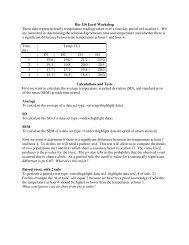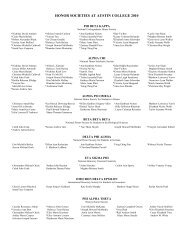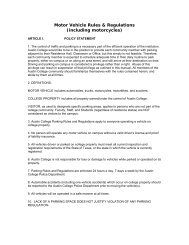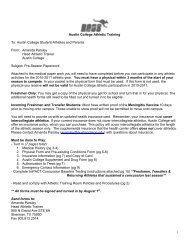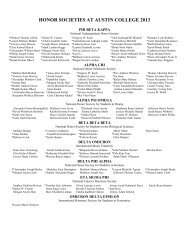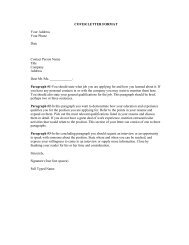You also want an ePaper? Increase the reach of your titles
YUMPU automatically turns print PDFs into web optimized ePapers that Google loves.
BIOLOGYStudents will learn organizational skills, laboratorytechniques, data acquisition and analysisskills, and will develop confidence in the laboratoryor field. Grading is S/D/U only; may berepeated when topic varies. Prerequisite: permissionof instructor.246 Eukaryotic PathogensExamines the biology of a variety of eukaryoticdisease-causing organisms. Topics includemorphology, physiology, life cycles, host immuneresponses, and causes of pathogenic effects.Emphasis is on protists, fungi, and metazoanparasites, primarily of vertebrates and especiallyhumans. Prerequisite: Biology 115 and116, or permission of instructor. (Spring ofodd-numbered years)248 Cellular PhysiologyAn introduction to the structure and functionof cells, with emphasis on the molecularmechanisms and signaling cascades of cellularprocesses. Emphasizes cellular response to theenvironment, communication in multicellularorganisms, and regulation of cellular physiologyat the level of transcription or protein modification.The course will involve discussionorientedlectures and will continue explorationof topics introduced in Biology 116. Laboratoryactivities will focus on understanding the complexitiesof cellular structure and physiology.Prerequisite: Biology 116 and Chemistry 112,or permission of instructor. (Each spring)250 Intermediate Topics in BiologyA study of selected topics offered on an occasionalbasis. May be repeated when topic varies.260 Intermediate Directed Study(Variable course credit)Intended for novice students to develop andexecute a project under close supervision ofa faculty member. Project goals and approachmust be approved by the department before theend of the 6 th week of the term. Students willpresent the results of their project as part of theBiology Department Seminar series. Prerequisite:permission of instructor.320 Vertebrate BiologyExamines selected aspects of the biology of thevertebrate animals. Topics include morphology,ecology, behavior, systematics, fossil history,and phylogenetic relationships. The laboratoryemphasizes qualitative and quantitative fieldstudies of local vertebrates. Prerequisite: Biology115 and 116, or permission of instructor.(Spring of even-numbered years)322 Comparative Vertebrate AnatomyA study of the structure and adaptations ofvertebrates. Evolution of vertebrate systems isemphasized in lecture. The laboratory includesa detailed study of the shark and cat. Prerequisite:Biology 234 or permission of instructor.(Usually each spring)324 Developmental BiologyA study of the embryonic development ofanimals with an emphasis on vertebrates. Thecourse integrates descriptive observations withexperimental studies in order to better understandthe underlying mechanisms of development.Prerequisite: Biology 115 and 116, orpermission of instructor. (Usually each fall)326 Animal BehaviorA study of the ecology and evolution of behavior.Topics include behavior genetics, biologicalrhythms, migration, predator-prey interactions,communication, reproductive behavior, sexualselection, and sociality. Field investigationsand current research in animal behavior areemphasized. Laboratory investigations requirestatistical analysis and interpretation of quantitativedata. Prerequisite: Biology 115 and 116,or permission of instructor. (Each fall)328 GeneticsExamines basic principles of genetics. Topicsinclude Mendelian genetics, the biochemistry ofthe hereditary material, and recent techniquesused in the study of genes and their interaction.Prerequisite: Biology 116 and Chemistry 112, orpermission of instructor. (Usually each fall)330 MicrobiologyAn exploration of physical and chemical propertiesof the bacterial cell. Topics include microbialmetabolism, growth of bacteria, microbialgenetics, and an introduction to pathogenicmicroorganisms and host defense mechanisms.Prerequisite: Biology 116 and Chemistry 112, orpermission of instructor. (Each spring)332 Evolutionary BiologyA study of concepts and mechanisms ofevolution. Topics include natural selection,coevolution, molecular evolution, systematics,and extinction. Prerequisite: Biology 115and 116, or permission of instructor. (Usuallyeach spring)334 EcologyExplores the fundamentals of ecologicalprocesses and concepts. Lectures emphasizepopulation growth and regulation, speciesCOURSES OF INSTRUCTION| 79




